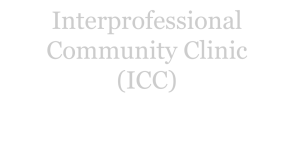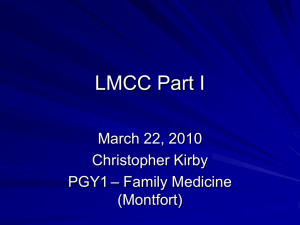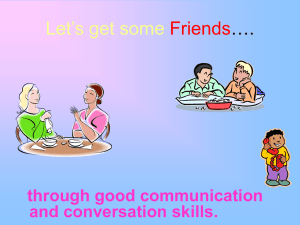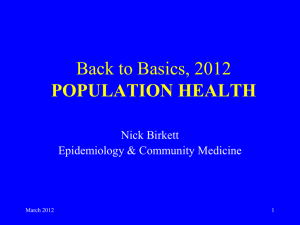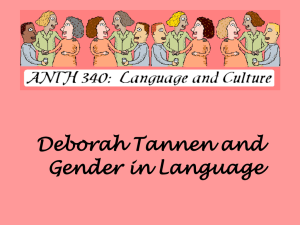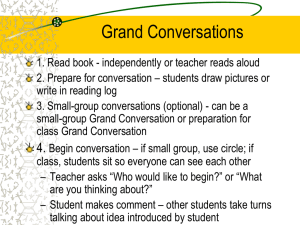IEC2013 - Tim Dornan presentation
advertisement
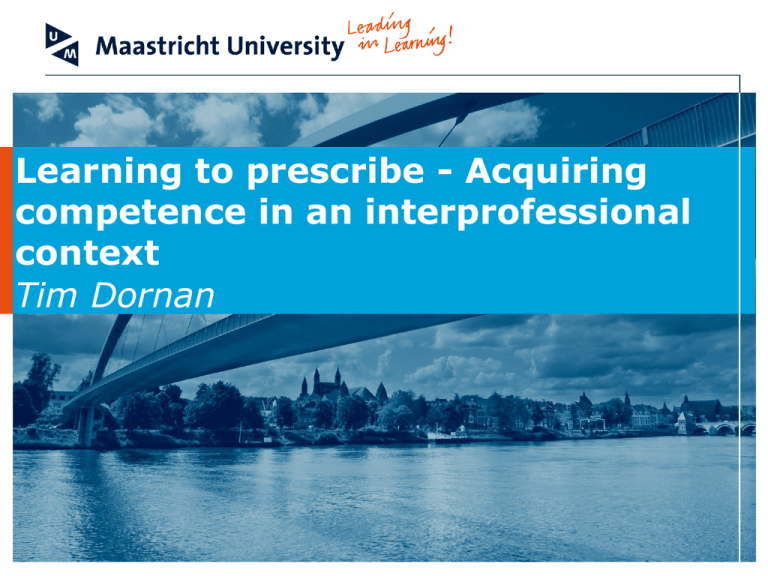
Learning to prescribe - Acquiring competence in an interprofessional context Tim Dornan Why is conversation so easy? Garrod and Pickering 2004 Consider spending 20 minutes: – Conversing with .. – Addressing .. .. one or more other people Which is: – Easier? – More complex? • Task switching, multitasking, timing etc Faculty of Health Medicine & Life Sciences – Department of Educational Development and Research Faculty of Health Medicine & Life Sciences – Department of Educational Development and Research Conversation is so easy because … Garrod and Pickering 2004 … humans are “designed” for dialogue rather than monologue Consider how children learn to speak Faculty of Health Medicine & Life Sciences – Department of Educational Development and Research Interprofessional education Faculty of Health Medicine & Life Sciences – Department of Educational Development and Research Interprofessional education Faculty of Health Medicine & Life Sciences – Department of Educational Development and Research Faculty of Health Medicine & Life Sciences – Department of Educational Development and Research Conversation 1 – in “reality” “…the Registrar came, reviewed him and said, “No, no we should give Tazocin, penicillin.” And, erm, by that stage I'd forgotten that he was penicillin allergic and I just wrote it on the chart without thinking. I say without thinking, cos it, I had thought of it already, but, erm, I suppose it was because of the security of thinking, “Gosh, someone’s finally come to help me with this patient,” I just, kind of, and did as I was told and, and, you know, didn’t look at the allergy box for a second time.” EQUIP 2009 Faculty of Health Medicine & Life Sciences – Department of Educational Development and Research Conversation 2 – in simulation N1 and Physician are monitoring the patient: Applying oxygen on a masque, adrenalin inhalation, and an i.v. syringe. •N1: Do you want me to prepare medicine for extraction? •P: I think we should infuse saline. And monitor the patient. •N1 calls for N2. •N1: Would you please put on some monitoring device on the patient. She is pregnant, 31 weeks and has been stung by a bee. She has a bit of stridor. (The patient gets more dizzy and tired) P is listening to the patient’s chest sounds. •P: Let’s do an ABC. We are dealing with an A-problem. •N1 (interrupting): She is having an anaphylactic reaction. I’ll give some Tavegyl 1 mg i.v. Charlotte Paltved and Peter Musaeus, Århus, DK Faculty of Health Medicine & Life Sciences – Department of Educational Development and Research Interprofessional education Identity… Faculty of Health Medicine & Life Sciences – Department of Educational Development and Research Conversation 1 – in “reality” “…the Registrar came, reviewed him and said, “No, no we should give Tazocin, penicillin.” And, erm, by that stage I'd forgotten that he was penicillin allergic and I just wrote it on the chart without thinking. I say without thinking, cos it, I had thought of it already, but, erm, I suppose it was because of the security of thinking, “Gosh, someone’s finally come to help me with this patient,” I just, kind of, and did as I was told and, and, you know, didn’t look at the allergy box for a second time.” EQUIP 2009 Faculty of Health Medicine & Life Sciences – Department of Educational Development and Research Conversation 2 – in simulation N1 and Physician are monitoring the patient: Applying oxygen on a masque, adrenalin inhalation, and an i.v. syringe. •N1: Do you want me to prepare medicine for extraction? •P: I think we should infuse saline. And monitor the patient. •N1 calls for N2. •N1: Would you please put on some monitoring device on the patient. She is pregnant, 31 weeks and has been stung by a bee. She has a bit of stridor. (The patient gets more dizzy and tired) P is listening to the patient’s chest sounds. •P: Let’s do an ABC. We are dealing with an A-problem. •N1 (interrupting): She is having an anaphylactic reaction. I’ll give some Tavegyl 1 mg i.v. Charlotte Paltved and Peter Musaeus, Århus, DK Faculty of Health Medicine & Life Sciences – Department of Educational Development and Research What is the task of prescribing? McLellan et al 2012 Faculty of Health Medicine & Life Sciences – Department of Educational Development and Research What is the task of prescribing? McLellan et al 2012 x x xx x xx x xxx x x x x x xx x x x x x xx x x x xx x x x x x x xx x x x x x x xx x x x xx x x x Faculty of Health Medicine & Life Sciences – Department of Educational Development and Research Conversation 3 – in Maastricht LMcC and TD: How can we design a prescribing training intervention? JvM and AdeB: Find how an expert does it and do a “task decomposition”? LMcC and TD: Hmmm. Perhaps we could study F1s and F2s JvM: That is like asking a pig to design a slaughterhouse Faculty of Health Medicine & Life Sciences – Department of Educational Development and Research Conversation 3 – in Maastricht LMcC and TD: How can we design a prescribing training intervention? JvM and AdeB: Find how an expert does it and do a “task decomposition”? LMcC and TD: Hmmm. Perhaps we could study F1s and F2s JvM: That is like asking a pig to design a slaughterhouse Faculty of Health Medicine & Life Sciences – Department of Educational Development and Research Conversation 3 – in Maastricht LMcC and TD: How can we design a prescribing training intervention? JvM and AdeB: Find how an expert does it and do a “task decomposition”? LMcC and TD: Hmmm. Perhaps we could study F1s and F2s JvM: That is like asking a pig to design a slaughterhouse Faculty of Health Medicine & Life Sciences – Department of Educational Development and Research Some time later ….. LMcC: You know, I’ve been thinking about what Jeroen said. No one individual is the expert TD: Aha … Ahaa … Ahaaa … Ahaaa … Ahaaaa … etc Faculty of Health Medicine & Life Sciences – Department of Educational Development and Research Later still in a northern UK city… Norris et al in preparation BN (Y4 medical student) does ethnographic research observing how Y5 medical students learn to prescribe in the shadowing period • Sees them being left behind by ward rounds and learning fragments of the prescribing task in relative social isolation from ANYBODY Faculty of Health Medicine & Life Sciences – Department of Educational Development and Research Identity development & emotions - 1 Pearson et al in preparation • “Figured Worlds” – Identity theory – Discourse analysis • 54 emotionally salient events in the daily learning lives of Y3 UK medical students (audio diaries and interviews) • Who were the “figures” in medical students’ identity construction? Faculty of Health Medicine & Life Sciences – Department of Educational Development and Research Identity development & emotions - 2 Pearson et al in preparation … this GP really inspired me … we went on a home visit to this patient, she’d just stopped taking all her pills, she was about 70 or 80 … she was like don’t stress yourself I don’t care … as long as you’re OK and you’re healthy and you’re taking your medication … Faculty of Health Medicine & Life Sciences – Department of Educational Development and Research Identity development & emotions - 3 Pearson et al in preparation … And it’s really nice seeing how caring people can be and how you can still maintain compassion once you’re a doctor … I learned the most in that recent GP block … cos she inspired me … I was constantly motivated and engaged and I just sucked up knowledge Faculty of Health Medicine & Life Sciences – Department of Educational Development and Research Interprofessional education Faculty of Health Medicine & Life Sciences – Department of Educational Development and Research Interprofessional education • Your education as a health professional? – Which decade was it? – In what culture was it? • What identity were you educated into? – Individual or an inter-professional identity? – How hierarchical was the culture within/between professions? Faculty of Health Medicine & Life Sciences – Department of Educational Development and Research Faculty of Health Medicine & Life Sciences – Department of Educational Development and Research To be grasped … • The (re)habilitation of learning by socialisation • Inequalities of status and power within and between professions • Developing individual vs developing collective identities – Social (Marxist) vs individualistic (capitalist) theories of identity Faculty of Health Medicine & Life Sciences – Department of Educational Development and Research A point of clarification • Interprofessionalism works brilliantly when it comes about naturally – Diabetes health care teams Faculty of Health Medicine & Life Sciences – Department of Educational Development and Research In the meantime … • Keep conversing with enthusiasm and humility with anybody and everybody – It’s easy! • Keep doing the innovative educational work you’re doing but don’t be too starry-eyed about what you can expect to achieve in the short term – True interprofessionalism requires major social change Faculty of Health Medicine & Life Sciences – Department of Educational Development and Research

